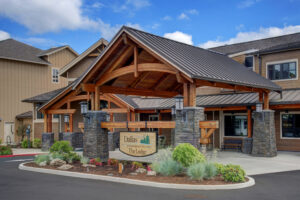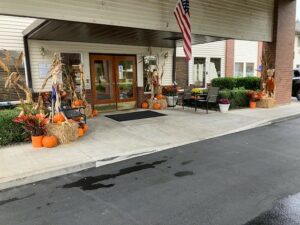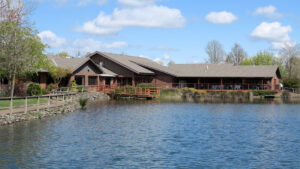Memory Care in Salem, Oregon: Search Near You, How To Pay, Licensing, Local Resources, and Questions To Ask
Memory care in Salem, Oregon, provides specialized support for individuals facing Alzheimer’s or other forms of dementia, ensuring a safe and compassionate environment. Oregon ranks among the top states for assisted living and senior care, reflecting its commitment to high-quality standards and personalized care options. Residents in Salem benefit from well-designed facilities, engaging programs, and expert staff dedicated to enhancing quality of life and maintaining dignity.
Some are available for private pay, and others for Medicaid-paid residents. Memory Care provides protective oversight, personal services, social care needed because of impaired capacity to live independently, and regular supervision on a 24-hour basis.
Memory Care Communities near Salem, Oregon

Emerald Gardens
Woodburn, Oregon 97071

Dallas Retirement Village
Dallas, Oregon 97338

Cedar Village
Salem, Oregon 97305

Brookdale Mcminnville
McMinnville, Oregon 97128

Mcminnville Memory Care
McMinnville, Oregon 97128

The Arbor At Avamere Court
Keizer, Oregon 97303

Battle Creek
Salem, Oregon 97306

Waverly Place Assisted Living
Albany, Oregon 97321

Windsong At Eola Hills
Salem, Oregon 97304

Mennonite Village
Albany, Oregon 97322

About Memory Care in Salem, OR
In Salem, Oregon, memory care is a specialized type of long-term care tailored to individuals living with Alzheimer’s disease, dementia, or other cognitive impairments. These communities focus on creating secure and supportive environments designed to reduce confusion and promote well-being. Services typically include 24-hour supervision, assistance with daily activities, medication management, and specially trained staff who understand the complexities of memory loss. Memory care facilities in Salem also provide structured programs and activities that encourage cognitive engagement, social interaction, and physical health. The goal is to offer residents a safe, enriching space that fosters independence and dignity while providing families with peace of mind.
Considerations when looking for Senior housing in Salem, OR
There are 21 memory care communities in Salem, Oregon. The estimated population of Salem is 177,432 with 15.3% of that number being those ages 65 and older. In Salem, the summers are short, warm, dry, and mostly clear and the winters are very cold, wet, and mostly cloudy. Over the course of the year, the temperature typically varies from 36°F to 85°F and is rarely below 25°F or above 96°F.
Cities near Salem, OR
- Keizer, OR – 4 miles north
- Woodburn, OR – 16 miles northeast
- Silverton, OR – 13 miles east
- Dallas, OR – 15 miles west
- Albany, OR – 26 miles south
Pricing and How to Pay for Memory Care
Paying for senior care depends on several factors. On average, residents can expect to pay $5,164 per month for memory care services. These fees encompass personalized care, engaging activities, and comfortable accommodations, ensuring a fulfilling retirement experience. Keep in mind these costs may fluctuate depending on factors such as location and facility amenities.

You want to consider your payment options for assisted living, memory care, and care homes. For these services, Medicare is NOT an option for payment.
The most common payment for these services would be out of pocket Private Pay and assessing a combination of retirement funds, personal savings, and pension payments.
Medicaid can also be an option, be sure to see if you or a loved one qualifies.
Long-Term Care insurance is also a possible option in cases of chronic conditions, be sure to see if you or a loved one qualifies.
For our Veterans and spouses of veterans, be sure to assess Veteran Aid and your eligibility for these benefits.
Medicare – NO:
- Medicare does NOT pay for Assisted Living.
- People 65 years and older and individuals with end stage renal disease are eligible for Medicare benefits, no matter their income.
- Coverage is meant for people in need of short-term care.
Private pay – YES:
- Many families pay for assisted living with private funds.
- Private pay can be a combination of retirement funds, personal savings, and pension payments.
- Family members may contribute funds to pay for assisted living or other senior housing and care.
Medicaid – MAYBE:
- Medicaid provides health coverage to millions of Americans. Eligible participants include: low-income adults, elderly adults and people with disabilities.
- Medicaid is administered by state, according to federal requirements. The program is funded jointly by each state and the federal government.
- Every state has their own individual Medicaid assistance program.
- National guidelines are in place do decipher how states must spend Medicaid money, but with allowances toward the guidelines.
- The state determines what levels of care will be covered by Medicaid, who is eligible, and how much the state will reimburse the care community.
- If you are unsure whether you qualify for Medicaid, you should apply. You may be eligible depending on your household income, family size, age, disability and other factors.
Long-term Care Insurance – MAYBE:
Long term care insurance is a great way to pay for assisted living, and planning ahead is important when considering how to pay for senior housing and care. Nearly 75% of people over the age of 65 will require long-term care and services at some point. Buying into long-term care insurance when a person is in their 50s and 60s is the most common time to do so.
- Long-term care insurance helps cover the costs of chronic medical conditions.
- Individuals and couples with the ability to pay into long-term care insurance have the advantage of a head start in allocating funds for senior care.
Veteran Aid and Assistance – MAYBE:
This benefit is available to some military veterans and surviving spouses who live in an assisted living community and those who have in-home care.
- There are specific guidelines, but a veteran may qualify for as much as $2,050 each month.
- A veteran with a sick spouse may be eligible for $1,600 per month.
- If a veteran has passed, their surviving spouse can qualify for $1,300 per month.

Questions to Ask
Finding a senior living community can be overwhelming. Here are some tips on things to be observant of:
- Make sure the facility is clean and well maintained. You can tell a lot about the operation by noting what is clean and maintained. Are doorknobs loose or damaged? Do you see any frayed carpet or trip hazards?
- Visit during lunch hour to observe what the residents are eating. Ask questions about the nutrition program. Is there diversity in meals, healthy fruits and vegetables served at all meals, drink options?
- Speak to residents and/or family members to learn their perspective.
- Ask about staff and resident engagement. Get a feel for how staff interact with residents.
- Ask about the life enrichment programs. Activities are crucial when it comes to quality of life and play a key role in care for older adults.
- And finally (along with a plethora of more things to consider), get to know the leadership in the building. If you feel good around the Executive Director, Head Nurse, Lead Activities Director and even the Chef or Janitor, it is a good sign you can trust them with the care of your loved one.
Local Hospitals and Healthcare Providers in Salem, OR
Salem Hospital
- Address: 890 Oak St. SE, Salem, OR 97301
- Phone: 503-561-5200
Santiam Hospital
- Address: 1401 N 10th Ave, Stayton, OR 97383
- Phone: 503-769-2175
West Valley Hospital
- Address: 525 SE Washington St, Dallas, OR 97338
- Phone: 503-623-8301
Silverton Hospital
- Address: 342 Fairview St, Silverton, OR 97381
- Phone: 503-873-1500
Legacy Silverton Medical Center
- Address: 342 Fairview St, Silverton, OR 97381
- Phone: 503-873-1500
Resources and Links – Oregon
Office of the Long-Term Care Ombudsman – The Office of the Long-Term Care Ombudsman is a free service available to residents, families, facility staff, and the general public.
Oregon Abuse Reporting Line for Children and Adults – To report elder abuse, please contact 1-855-503-SAFE (7233). State law protects the confidentiality of all people reporting abuse and anyone who reports suspected abuse in good faith. The department also accepts anonymous complaints of abuse or neglect.
Confederated Tribes of Siletz Indians of Oregon-Elders Program – Caregiver Programs, Case Management, Home Health Services, Emergency Response System, Employment Services, Legal Assistance, Home Repair, Home Modification, Information and Referral/Assistance, Home Delivered Meals, Congregate Meals, Personal Care, Respite Care, Government-Assisted Housing, Sr. Center Programs
Nursing Facility Complaint Unit– If you suspect a nursing facility resident was neglected or abused, please contact the Nursing Facility Complaint Unit
Eldercare Locator This is a great resource to search for specific care in specific counties and cities. This database is a nationwide resource that connects older Americans and their caregivers with trustworthy local support resources. Connect with services such as meals, home care or transportation, or a caregiver education or respite from caregiving responsibilities. The Eldercare Locator is a public service of the Administration on Aging (AoA), an agency of the U.S. Administration for Community Living.
Medicare provides a search feature to find & compare providers near you, most senior housing and care providers are included on CareAvailability.com. Find & compare plans in your area. Determine if you qualify for premium savings
Medicaid offers information on how to apply for Medicaid, eligibility criteria, links to local state offices, and additional resources
The Alzheimer’s Association is the leading voluntary health organization in Alzheimer’s care, support, and research. Whether you are living with Alzheimer’s or caring for someone with the disease, information and resources are available.
Search other areas for Memory Care
Not finding what you’re looking for? Take a look below.
